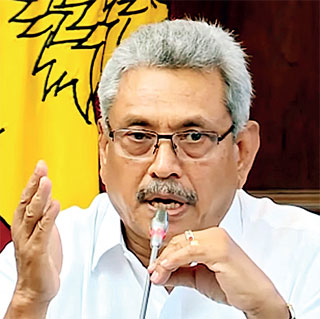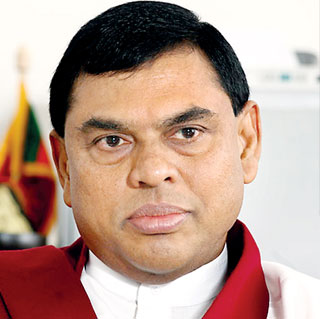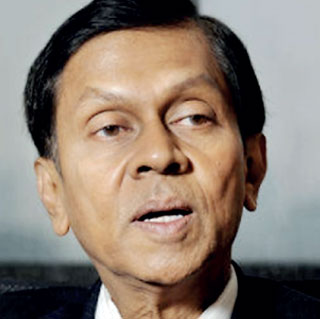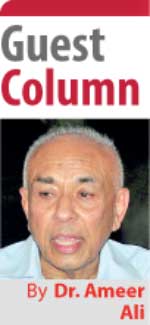Monday Feb 16, 2026
Monday Feb 16, 2026
Tuesday, 8 March 2022 02:58 - - {{hitsCtrl.values.hits}}

President Gotabaya Rajapaksa

Minister of Finance Basil Rajapaksa

Central Bank Governor Ajith Nivard Cabraal
 IMF has finally spoken and there was nothing new or unexpected in what it said. Its recommendations to adopt revenue enhancing measures by increasing income tax and VAT, tightening Central Bank’s monetary policy to check inflation and aggregate demand by raising interest rate, giving up managed float in favour of free float in foreign exchange market, introducing serious structural reforms to improve the performance of parastatals, improving business climate to make it attractive for local and foreign investors, prudent management of Colombo Port City, and cleaning the government of corruption are nothing new. They are the pet remedies of IMF to troubled economies.
IMF has finally spoken and there was nothing new or unexpected in what it said. Its recommendations to adopt revenue enhancing measures by increasing income tax and VAT, tightening Central Bank’s monetary policy to check inflation and aggregate demand by raising interest rate, giving up managed float in favour of free float in foreign exchange market, introducing serious structural reforms to improve the performance of parastatals, improving business climate to make it attractive for local and foreign investors, prudent management of Colombo Port City, and cleaning the government of corruption are nothing new. They are the pet remedies of IMF to troubled economies.
There is also nothing ideological about it, because if economies have chosen to remain open and be integrated with the global economy, then they have to play by the rules of the game. Sri Lanka cannot pick and choose the rules and expect to reap full benefits from the system. IMF has set out its remedial measures in advance before the Minister of Finance and his team flies to Washington.
Will the Rajapaksa regime bite the bullet, accept IMF assistance and implement those recommendations in full? It is highly unlikely, because some of the recommendations, such as increasing direct taxes, structural reforms, improving business climate, management of Colombo Port City, and ending corruption go to the very heart of the regime’s political strength. They would undermine the very foundation of the regime’s support base built on patrimonialism, cronyism and ethno-nationalism. The regime may negotiate with IMF to pick and choose what it would like to implement, but that selective implementation would not be able to pull the country out of its abyss.
Cracks in the economy and society are too deep to cover with patchwork repairs. In fact, the economic history of post-independent Sri Lanka had been a story of patchwork reforms and their failures. Even the leftists of the previous era who advocated revolution to destroy the rotten socio-economic edifice and start development on a clean slate, ultimately ended up introducing patchwork reforms in coalition with the very forces of reaction which they wanted to get rid of. Anyhow, that was a different era and despite the failures, the extent of economic destitution and misery did not reach such an intolerable level as it has now.
President GR’s two years of experiment with an undefined and unstructured “alternate way” to development has collapsed abysmally. His authoritarian way of introducing and implementing economic policies and open bias against minorities had not only destroyed the economy but also disconnected almost one-third of the population from mainstream development. Even the other two-third is now left with only his broken promises. It is unfortunate that the Central Bank in trying to please the President had contributed to this calamity.
Even after all this the regime is not willing to go to IMF. No doubt, the IMF medicine package would be too bitter to swallow and the pain would be felt ultimately by the final consumer, but at least the severity of that pain could be mitigated if corruption is cleaned up, mafia lobby is kept out and structural reforms are undertaken. That would be an impossibility for the Rajapaksa regime.
But which party or coalition of parties would undertake this clean up? Apart from the SLPP of Rajapaksas, there are six other candidates on the run: UNP under RW, SJB led by SP, SLFP under MS, NMSJ of an 82 years old KJ, 43-Brigade of PCR and NPP led by AKD. The ethnically parochial Tamil and Muslim parties have absolutely no chance of forming any government. Of the leading six, only two, NPP and 43-Brigade, have at least published some sort of a manifesto even though those documents do not go far enough to show a clear picture of how the two parties, if given a chance to govern, would set about reviving and restructuring the economy and how long would they take to accomplish it.
While NPP’s manifesto is filled with ideological criticisms of the open economy and neo-liberalism, 43-Brigade’s “Rescue and Thrive” document is sprinkled with strong doses of patriotism, addressed mainly to the grandchildren of the Kannangara era, with an emotional attack on the state of the economy without presenting a forward plan about how to rectify it. It also contains one sentence about recognising minority rights. Yet, one should remember that Sinhala-Buddhist ethnonationalism runs in its leader Patali Champika Ranawaka’s blood. His political career is noted for his membership in the Sinhala nationalist party, Sinhala Urumaya. He called the Muslims of this country aliens and launched his “Jihad and Al-Qaeda” written in Sinhalese in front of a distinguished panel from the saffron army.
However, all leading contenders of power except NPP are prepared to accept a negotiated IMF package. But whether any of them either singularly or as part of a coalition, would be able to offer a government free of corruption, and whether they would undertake structural reforms, and in addition whether they would discard the dominant majoritarian ideology in the interest of reconnecting the disconnected is doubtful. But what about NPP?
NPP and its leadership lack any experience in governing. At least the leader of 43-Brigade had been a minister in the 2010-15 government. However, given the blemished past of these contenders, NPP’s inexperience in governing has an advantage in the sense that the party and its leadership are free of the scandals and blames that mar the record of others. The uniqueness of NPP is its radical bent and support base among the young and educated and the urban working class. The party leader AKD has so far been a fearless critic of the ruling regime and he has exposed with hard evidence the extent of corruption, nepotism and mismanagement that had created the present crisis. He had not spared even the previous regimes in his attack.
However, NPP has to sort out its internal command structure, which appears to be in a state of flux, and come out with a specific and time bound plan to make it clear to voters the measures it would take to restructure the economy and revive growth independent of IMF assistance. It should also make it clear and in no uncertain terms that it would discard the majoritarian ideology and reconnect the disconnected in a united struggle for economic revival. That plan could then become the rallying point for progressive elements in other parties to come under NPP umbrella.
It is a tall order, but at the end, barring GR-MR’s unpredictable political machinations, it would have to be a confrontation between two grand coalitions: one, IMF-allied but corrupt, and the other, IMF-independent but clean and progressive.
(The writer is attached to the School of Business and Governance, Murdoch University, Western Australia.)